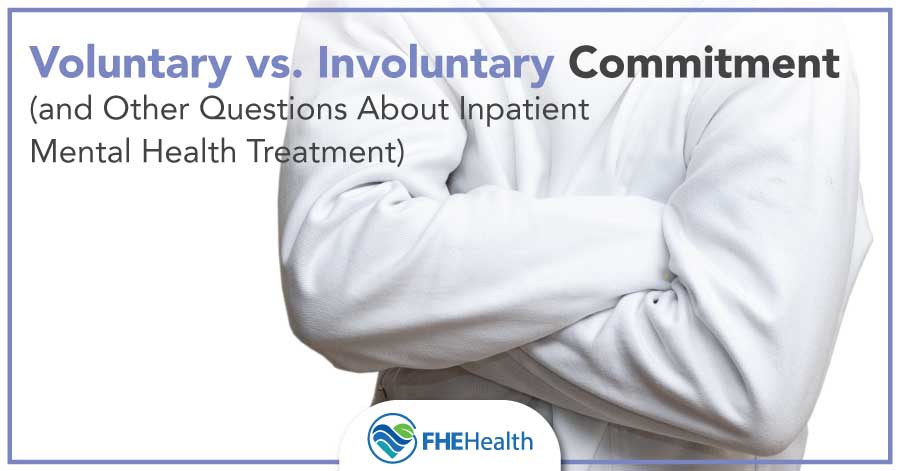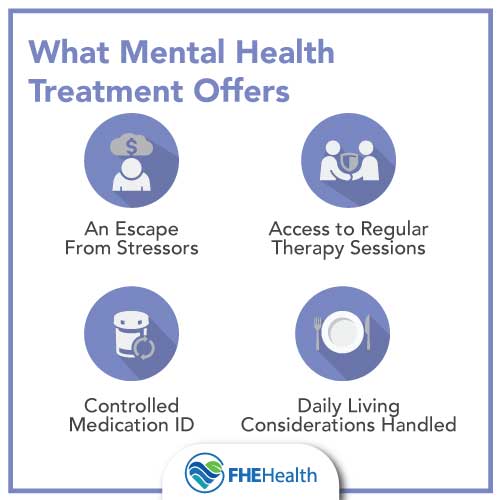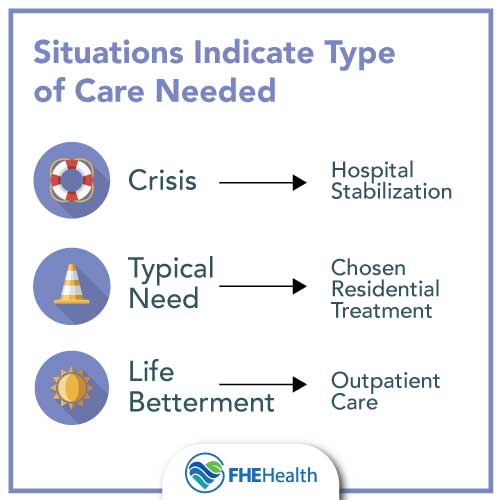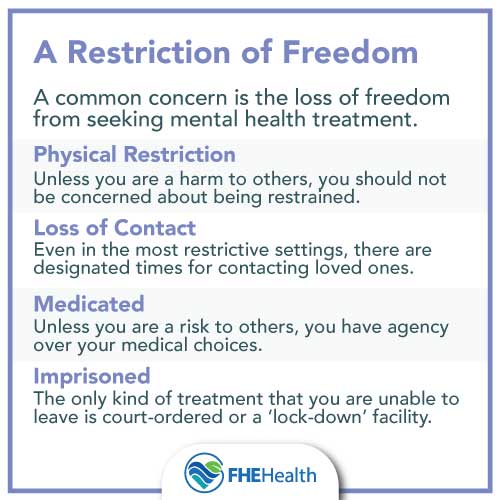
The image of inpatient or residential mental health treatment may paint a picture of a hospital ward or an asylum in which patients are locked up to keep them safe from themselves and others. The truth is, this is far from the experience of patients in residential programs today.
Most people seek treatment from mental health providers for their own benefit, choosing to step away from day-to-day life to get the help they need.
With 3.4 percent of the adult U.S. population in need of serious psychological support and with 59.8 million visits to therapists occurring each year, according to the National Center for Health Statistics, it’s clear people need help from a modern, supportive environment.
What Today’s Inpatient Mental Health Services Offer
 Consider a relaxing, supportive environment, perhaps like a retirement village. Within this setting, mental health professionals, including medical doctors and therapists, offer assistance. It’s a welcoming, home-like experience.
Consider a relaxing, supportive environment, perhaps like a retirement village. Within this setting, mental health professionals, including medical doctors and therapists, offer assistance. It’s a welcoming, home-like experience.
You step into this space to get help, but all of your needs are considered and taken care of during your stay. Your sole goal is to focus on your health and improvement.
Inpatient therapy provides comfortable living quarters. Group and individual therapy sessions are held in modern spaces with ample lighting.
Rooms have the basic comforts of home, sometimes even offering better-than-home quality living spaces. Yet, in this environment, the goal is still to help you through to recovery.
Involuntary Rehab – Being “Committed” in Residential Treatment
Older views of inpatient therapy focused on the concept of being committed. It is still possible for the court to determine you need to enter a mental health facility for treatment. This may occur after an illegal act or when the family brings evidence to court to show you are a danger to yourself.
Involuntary inpatient care only occurs through the legal system with ample evidence of risk. No one can simply decide to have you admitted against your will and without some level of risk.
In some situations, patients may be placed on a 72-hour psychiatric hold. During this time, they remain in a secure facility that allows doctors and therapists to monitor their health and mental state. This scenario occurs in cases where a person may have threatened suicide or harm to others. The goal is to help the person regain stability and proper treatment.
Involuntary treatment remains a positive and generally comfortable environment. Most people are not shackled or locked in cold, dark rooms. There are no scary procedures or tests. These images of what you think is going to happen are far from reality.
Most Treatment for Mental Health Is Through Voluntary Admission
There are several ways to get mental health treatment today. The most common form is scheduling an appointment with a local therapist. For those with day-to-day struggles but the ability to function normally, this may be all that’s necessary.
For others, inpatient mental health treatment is ideal. It allows a person to step away from their life to focus on their mental health through voluntary commitment. There are several ways to voluntarily admit yourself to this type of help.
A Mental Health Crisis
 A crisis occurs when a person is facing a significant risk to their well-being and mental health stability. In this case, a person cannot go on or does not feel as though they can maintain their well-being. In some situations, a person should visit an emergency room as an immediate source of help.
A crisis occurs when a person is facing a significant risk to their well-being and mental health stability. In this case, a person cannot go on or does not feel as though they can maintain their well-being. In some situations, a person should visit an emergency room as an immediate source of help.
This is necessary if:
- There’s a suicide attempt.
- A person displays aggressive behavior, assaults someone or threatens to assault another person.
- Drug and alcohol use is evident, and detox is necessary.
- There is a sense of paranoia, hearing voices or significant confusion.
In an emergency room, a patient is stabilized, drug or alcohol overdose risks are managed, and medications are given as necessary. From here, doctors can encourage residential treatment based on the situation.
A Typical Need
If you or your loved one needs mental health care, contacting and working with a rehabilitation location takes just a phone call. You don’t need to work through your doctors or any other service.
You can simply call the facility, talk to an admissions counselor and make the decision to get care. If you are not sure you need inpatient care, speak to your family doctor about your individual needs.
Outpatient Therapy Is a Viable Option
If the thought of getting help is promising to you, but you’re also worried about being away from family, consider the outpatient therapy option. This model of care is the most common. It involves living at home but receiving daily or several times-a-week care at a treatment center.
You spend time learning, growing and recovering at your own pace. This option is best for those without an immediate risk and a stable home environment.
When Is Inpatient Needed and Why Is It Effective?
Inpatient therapy is intensive, focused and designed to be effective at helping those with serious mental health needs. In these situations, inpatient psychiatric treatment is more effective at helping to stabilize an individual and help them get the necessary care. Consider a few examples of when this type of care is best.
Controlled Environment
An important time to consider this care is when you need medication to manage your mental disorder. Because this is a controlled environment, doctors can work to properly prescribe medications and monitor for any side effects. They are able to provide immediate guidance and changes as necessary to help you get the right level of control.
Diagnosis Is Necessary
Perhaps you haven’t been formally diagnosed with a mental health disorder, or your case is complex. In an inpatient treatment program, doctors can explore more of what is occurring, why it is happening, and what co-occurring conditions are present. To obtain proper treatment, you need an accurate diagnosis.
Alcohol or Drug Abuse Is Present
Another key time when inpatient care is necessary is when a serious drug or alcohol addiction is present. Many people with addiction have underlying mental health conditions that aren’t fully understood. Detox, followed by residential care, can help doctors to really see what’s occurring so that proper care is available.
Will I Be Sealed Away?
 It’s not uncommon for people to worry about isolation. No one wants to be in a room alone to battle their thoughts. Yet, isolation isn’t common in these situations.
It’s not uncommon for people to worry about isolation. No one wants to be in a room alone to battle their thoughts. Yet, isolation isn’t common in these situations.
Rather, you’re involved in a wide range of treatment programs throughout the day. This includes group sessions, one-on-one appointments with your doctor and family-focused programs.
Your family, in most cases, is welcome to visit and engage in your treatment. You have an important support structure present, including your family, to help with recovery.
Are Residential Psychiatric Units/Facilities Safe?
It’s essential for patients to feel like they are in a safe and supportive environment. Like any hospital setting, these locations are designed to have plenty of staff to support your needs.
Abuse, while it is serious and widely reported, is not a prevalent problem, nor is it something you’re likely to encounter. Security is an important focus of the very best locations.
Will I Be Drugged?
Another misconception many have about residential treatment is that they will be drugged or sedated. Unless you have a medical condition that requires this, it’s not likely to occur. You are not likely to experience any situation where you’re not there to engage in your own treatment.
Most importantly, you shouldn’t be worried or afraid to get help. It is one of the best opportunities for you to regain health and mental stability no matter what illness you are facing. You can get back to your life with the ability to enjoy it again.
Want to Learn More About Inpatient Mental Health Treatment?
Residential mental health treatment at FHE Health offers you the latest methods and tools. To learn more about your options and our quality of care, contact our admissions counselors at (833) 596-3502. We’re available 24/7 to provide confidential support to you.






